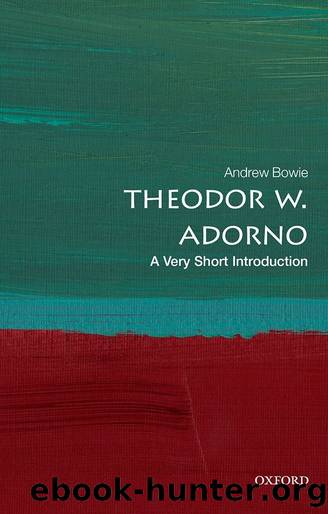Theodor W. Adorno by Andrew Bowie

Author:Andrew Bowie [Bowie, Andrew]
Language: eng
Format: epub
ISBN: 9780192570604
Publisher: OxfordUP
Published: 2022-01-11T00:00:00+00:00
Jazz
Adornoâs interpretation of all forms of US popular culture of the time as means of cementing conformism raises some fundamental questions. This is where the example of jazz is significant, because it does not fit well into Adornoâs approach. There is a paradigmatic mismatch between his overall theoretical frame, and the empirical evidence concerning a supposed manifestation of the culture industry. It is therefore worth considering the issue in a bit of detail. Adornoâs essay âOn Jazzâ, the first piece he wrote on the topic, is from 1936, before he went to the USA, so it was based on recordings, sheet music, and whatever he may have heard in Europe that was called jazz. The lack of detail to back up his case could be seen as a result of his contingent circumstances at the time. However, he refers to the jazz essay even in his work in the 1960s, though by that time his view was sometimes more differentiated. Core ideas of the essay are also carried over into the analyses of the culture industry in DE, and elsewhere.
Adornoâs later use of his 1936 analysis is already put in question by the fact that, even by 1944, jazz had radically changed from the jazz referred to in the essay. The âbebop revolutionâ of the 1940s was a reaction against commercially promoted swing music, which was in effect the pop music of the time and is in some of its manifestations the justified target of Adornoâs criticisms. The progenitors of bebop were mainly black musicians, and the increased technical demands of the music were not least intended as a means of excluding musicians who just followed the commercialized vein of swing. The pursuit of a new jazz vocabulary in bebop also involved an element of political protest against a dominant white culture. Bebopâs extension of harmonic, melodic, and rhythmic vocabulary lays the foundations of jazzâs continual revision and questioning of received musical assumptions and practices that continues to this day.
Even before bebop, jazz had, through figures like Louis Armstrong, begun to help establish a specifically black urban culture that generated resistance to white domination. In the jazz essay Adorno insists, though, that âthis much is certain, that the serviceability of jazz does not negate alienation, but amplifies it. Jazz is a commodity in the strict sense, it is subject to the laws, and the contingency of the marketâ (GS 17 p. 78). Insofar as everything is affected by those laws and that contingency, this is, of course, necessarily the case. However, the fact that from the early 1940s probably the most important development in jazz history was a reaction against what was dominating the market, and many of Charlie Parkerâs (eventually) most influential recordings were made on obscure, commercially unsuccessful labels, suggests Adorno neglects the dialectic involved in the commodification of jazz. It is precisely when jazz became more assimilated into the mass market that it produced some of its most important music as a reaction against that assimilation. In this sense, jazz does precisely what Adorno, as we shall see, demands of ânew musicâ.
Download
This site does not store any files on its server. We only index and link to content provided by other sites. Please contact the content providers to delete copyright contents if any and email us, we'll remove relevant links or contents immediately.
The remains of the day by Kazuo Ishiguro(8957)
Tools of Titans by Timothy Ferriss(8356)
Giovanni's Room by James Baldwin(7308)
The Black Swan by Nassim Nicholas Taleb(7095)
Inner Engineering: A Yogi's Guide to Joy by Sadhguru(6780)
The Way of Zen by Alan W. Watts(6586)
Asking the Right Questions: A Guide to Critical Thinking by M. Neil Browne & Stuart M. Keeley(5745)
The Power of Now: A Guide to Spiritual Enlightenment by Eckhart Tolle(5736)
The Six Wives Of Henry VIII (WOMEN IN HISTORY) by Fraser Antonia(5492)
Astrophysics for People in a Hurry by Neil DeGrasse Tyson(5172)
Housekeeping by Marilynne Robinson(4429)
12 Rules for Life by Jordan B. Peterson(4294)
Double Down (Diary of a Wimpy Kid Book 11) by Jeff Kinney(4254)
The Ethical Slut by Janet W. Hardy(4235)
Skin in the Game by Nassim Nicholas Taleb(4229)
Ikigai by Héctor García & Francesc Miralles(4228)
The Art of Happiness by The Dalai Lama(4118)
Skin in the Game: Hidden Asymmetries in Daily Life by Nassim Nicholas Taleb(3983)
Walking by Henry David Thoreau(3943)
